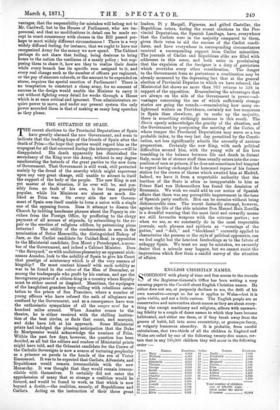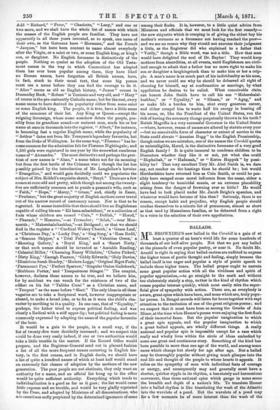ENGLISH CHRISTIAN NAMES.
SOMEBODY with plenty of time and free access to the records of the Registrar-General's Office has been writing a very amusing paper in the Cornitill about English Christian names. He either does not see, or purposely declines to see, the drift of his own narrative—except so far as it applies to Wales—but it is quite visible, and not a little curious. The English people are as conservative and uninventive about names as they are about every- thing else except machinery and religions, adhere with unswerv- ing fidelity to a couple of dozen names to which they have become habituated, and either use them, or if they break away from the groove of habit, fall into some eccentricity, or grotesque fancy, or vulgarly humorous absurdity. It is probable, from careful calculations, that two-thirds of all the children in England and Wales are called by one of the following twenty-five names, cer- tain that in any 100,000 children they will occur in the following order :—
Order.
Names. Numbers. Order. Names. Numbers.
1 Mary 6,819 16 Emily 1,615 2 William 6.590 17 Frederick 1,604 8 John 6,230 18 Annie 1,580 4 Elizabeth
4,617
19 Margaret 1,548 5 Thomas 3,876 20 Emma 1,510 6 George 3,620 21 Elise. 1,507 7 Sarah
3,602
22 Robert 1,323 8 James 3,060 23 Arthur 1,237 9 Charles 2,323 24 Alfred 1,232 10 Henry 2,060 25 Edward 1,170 11 Alice 1,925
12 Joseph 1,780
Total number of children 13 . Ann 1,718
(out of 100,000) rests-
14 Jane
1,697
tared under the above
15 ...... Ellen 1,621
25 DAMN
65,892
Add " Richard," "Peter," "Charlotte," "Lucy," and one or two more, and we shall have the whole list of names with which the muses of the English people are familiar. They have not apparently in all these years invented, so to speak, one name of their own, as the Germans have "Hermann," and the French "Jacques," but have been content to name almost everybody after the Virgin, or a saint or two, or some English king, or king's son, or daughter. No English forename is distinctively of the people. Nothing so quaint as the adoption of the Old Testa- ment names in the way in which Connecticut has adopted them has ever been popular among them, they have liked no Roman names, have forgotten all British names, have, in fact, stuck to their usual text, that some big person must use a name before they can find the courage to do it. " Alice " seems as old as English history, " James " occurs in Doomsday Book, "Robert" is Teutonic and very old, and " Mary " of course is the pre-eminently Catholic name; but for the rest, every name seems to have derived its popularity either from some saint or some English king. The people, it is true, have a little sense of the sameness of their list. Any King or Queen—except the reigning Sovereign, whose name somehow deters the people, pos- sibly from its grandiose sound—or eminent man, sends his or her name at once in thousands into the register, "Albert," for instance, is becoming fast a regular English name, while the popularity of " Arthur " dates not from Mr. Tennyson's legendary favourite, but from the Duke of Wellington. In the same way, " Florence " has be- come common for the admiration felt for Florence Nightingale ; and 1,500 girls were registered in one year by the somewhat cumbrous 'name of "Alexandra." The most distinctive and perhaps the pret- tiest of new names is "Alma," a name taken not for its meaning but from the first battle of the Crimean war ; though the list has possibly gained by the introduction of Mr. Longfellow's heroine " Evangeline," and would gain decidedly could we popularize the subject of Mrs. Riddell's exquisite sketch, "Beryl." There are a few names at once odd and pretty, which though not among the twenty- five are sufficiently common not to puzzle a peasant's wife, such as 4‘ Faith," "lope," "Mercy," "Grace," and, chiefly in Essex, 'Prudence," but the great majority of English mothers never travel out of the narrow record of customary names. Nor is that to be regretted. It seems incredible that there should live au Englishman capable of calling his son "Eli lama sabachthani," or a collection of fools whose children are named "Cain," "Delilah," "Herod," "Pharaoh," "Hosanna,"—at Tremadoc ; " Sclah,"—near Mon- mouth ; " Mahershalalhashbaz,"—at Bridgend ; or that we should find in the register a " ' Cardinal Wolsey Church,' a Green Leaf,' 'Christmas Day,' a Lucky Day,' a Sing Song,' a Rose Budd,' -a Seaman Skipper,' a 'Trial Palmer,' a Valentine Orson,' a Shooting Gallery,' a Royal King,' and a 'Smart Natty,' -or that such names should be invented as Amiable Reading,' 4 CelestialMiller," Charming Nancy Wiltshire,' 'Choice Pickrel,' 4 Dirty King,' 'Enough Pearson,' 'Giddy Edwards,' Holy Davies,' 'Illustrious Sarah Hendry,' Modern Leggs," Original Bigot Peels,' 'Paramount Pye,' Perfect Sparrow,' 'Singular Onion Gallehawk,' Stubborn Porter,' and 'Tempestuous Stinger.'" The essayist, however, declares these names to be true, and we believe him, for by accident we can vouch for the existence of two of the oddest on his list " Talitha Cumi " as a Christian name, and " Tempest " as the same before "Sleet." The only ideas in all these vagaries are to take a Scriptural word, however inappropriate or absurd, to make a broad joke, or to fix as it were the child's cha- racter by ascribing to it a quality. In one case, that of "Equality," perhaps, the father tried to express political feeling, and was clearly a Radical with a stiff upper-lip ; but political feeling is more commonly expressed by adopting the name of the popular favourite of the hour.
It would be a gain to the people, in a small way, if the list of twenty-five were decidedly increased ; and we suspect this could be done very easily indeed, if one or two authorities would take a little trouble in the matter. If the Record Office would prepare, and the Registrar-General send out in placard fashion a list of all the more frequent names occurring in English his- tory, in the first census, and in English deeds, we should have a list of quite a hundred names of which at least half would stand an extremely fair chance of adoption by the mothers of the new generation. The poor people are not obstinate, they only want an authority for a name, and an official list hung up in the office would be quite sufficient authority. Everything which tends to individualization is a good as far as it goes ; the list would cause little expense and no trouble, and would be very gladly reprinted by the Press, and adopted by Ministers of all denominations, who are Eometimes sadly perplexed by the determined ignorance of some ' among their flocks. It is, however, to a little quiet advice from Ministers and officials that we must look for the first remedy— the new etiquette which is creeping in of giving the eldest boy his mother's surname as a forename not having reached the poor-- and we see no reason why they should not exercise their judgment a little, as the Registrar did who explained to a father that "Verily," though a Bible word, was not a title. How that man would have delighted the soul of Dr. Baylee ! They would keep mothers from absurdities, at all events, until Englishmen are civil- ized enough to admit that a father has no more right to make his son or daughter a laughingstock than to make him or her a crip- ple. A man's name is as much part of his individuality as his nose, and we never could see why he should be debarred all right of choosing for himself, say at confirmation or marriage, by what appellation he desires to be called. What conceivable claim can honest John Smith have to call his son " Mahershalal- hashbaz," or "Equality," or "Siloam," or " Agag," and so make life a burden to him, shut every generous career, and either compel him to waste half his energy in bearing off his name, or, like the President of the United States, run the risk of having the necessary change perpetually thrown in his teeth? Beriah Magoffin is a very successful Governor in the United States —where, however, reams of names are altered by statute every year —but no conceivable force of character or extent of service to the State could elevate "Ananias Bugg" to the English Premiership, though unless we are mistaken, one of the names the Cornhill quotes as unintelligible, Herod, is the distinctive forename of a very good English family ? It is quite immoral to condemn children to be Dissenters whether they like it or not, yet what else could " Hephzibah," or " Hadassah," or " Keron Happuk " by possi- bility be? That very excellent Tory Mr. Abel Smith is, we dare say, not meeker on the hustings than he should be ; but would Hertfordshire have returned him as Cain Smith, or could he pos- sibly have escaped some moral influence from the name, either a. slight tendency •to homicidal mania, or an extreme placability arising from the danger of frowning ever so little? He would have had to look placid under Mr. Jacob Bright's speeches, and whatever would have become of him then? Seriously, there is no reason, except habit and prejudice, why English people should confine themselves to a minute list of przenomens, almost as short as that used by Mussulman families, or be debarred from a right to a voice in the selection of their own appellatives.



































 Previous page
Previous page